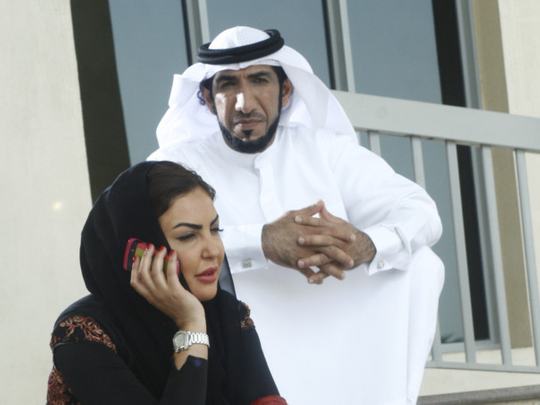
Royal Love is a film that fought to exist.
The hour-and-a-half Emirati movie was self-financed by screenwriter and director Jamal Salim, filmed over 14 days, shown for the first time at the 2013 Gulf Film Festival, and curiously, at a Korean cultural festival. This Thursday, it finally hits cinemas across the UAE.
For a movie with an out-of-pocket budget and a short filming period, it delivers more entertainment than you would initially think.
From the very beginning, Royal Love’s characters are real and likeable. The clumsy but endearing protagonist, Zaal (Abdullah Zeid), has a name that translates to “sadness”, but his hopeful disposition wouldn’t suggest it. He’s perpetually pining after Jori (Huda Salah), the plump-lipped university student he passes in the hallways and trips over his feet for, but never works up the nerve to talk to.
His best friend, Rashid (Juma Ali), delivers some of the film’s funniest lines while putting Zaal down — with affection — and telling him in no uncertain terms that Jori will never be in his league. Indeed, that seems to be the whole point of the movie.
Meanwhile, Faisal (Habib Ghuloom), a wealthy and influential man often referred to as “Shaikh” in the film, spots Jori in a photo album left in his car by his delivery man, Jori’s father, Hussain (Mansour Al Feeli). He becomes instantly infatuated by her and wants to marry her in secret.
But when Jori finds herself veering off a bridge and landing herself in a coma, it is Zaal and not Faisal who comforts her for three years of her hospital stay, and when she wakes up, it’s Zaal and not Faisal who she asks for.
The film is funny, charming and understated, but falters in its last moments with an unnecessarily abrupt plot-twist ending. The finale feels too dramatic to be held up by the weight of the light-hearted film, and though it tries to deliver a social message of choosing love over status, it falls flat.
Royal Love’s other major pitfall lies in the insulting lack of depth given to Jori, the female lead — we have no idea who she really is, and why these men are out of their minds over her, except that she’s pretty, demure and likes flowers. It would have been nice to see what makes her tick, rather than have her comatose for the majority of the film.
Overall, Royal Love is a flick worth watching and supporting as part of a local cinema that is determined but struggling to thrive. With his first feature film, Salim sets up a small but compelling world, makes an effort to incorporate lively side characters (though some tired stereotypes could have been avoided), and most importantly, gains the empathy of his viewers throughout.








